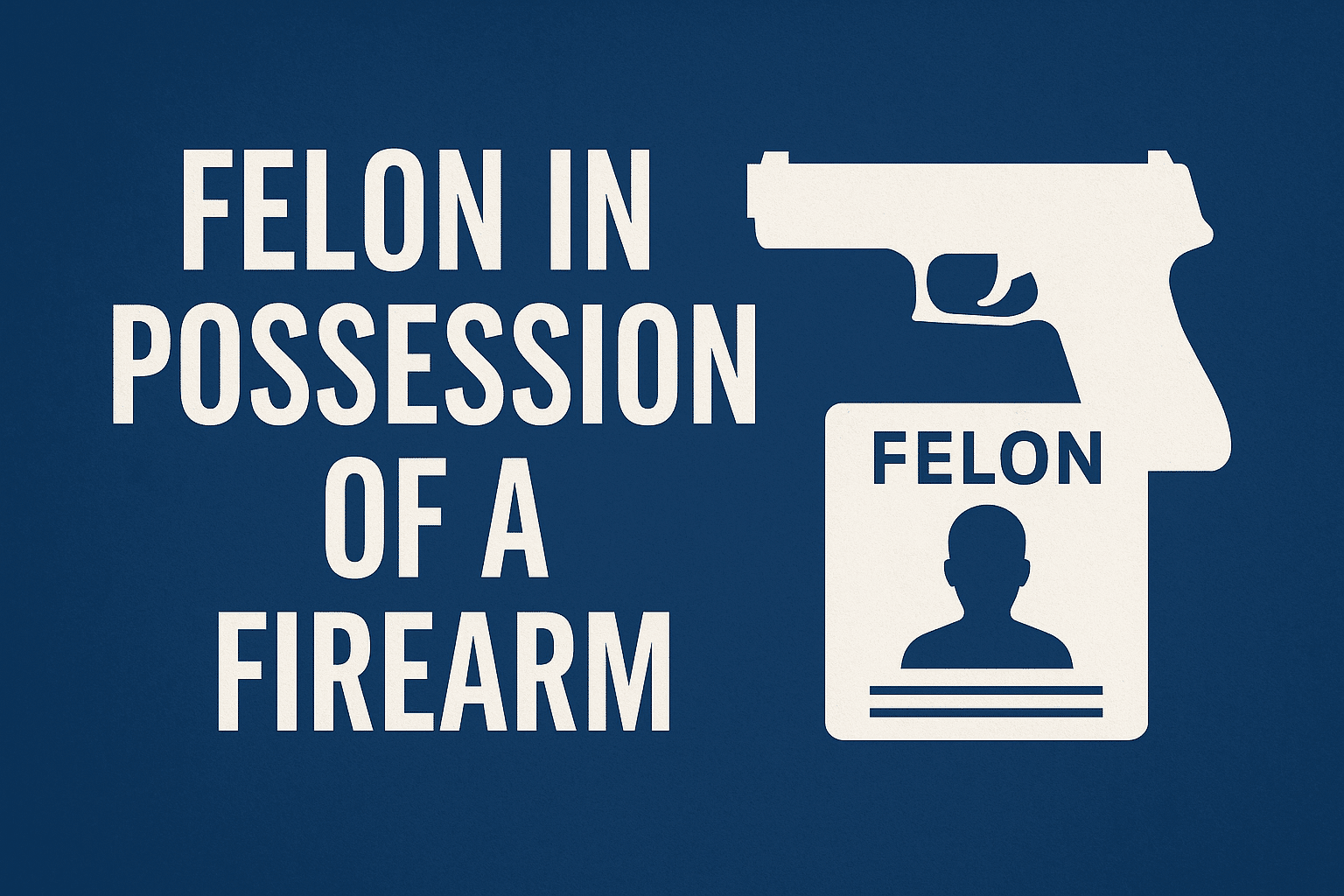
Being charged as a felon in possession of a firearm in Maryland is one of the most serious gun-related offenses a person can face. While federal law also prohibits convicted felons from owning guns, Maryland has its own strict laws and penalties that apply even if a firearm never crosses state lines. Understanding these laws—and the limited paths to restoring firearm rights—is essential for anyone with a prior conviction in Prince George’s, Charles, Calvert, or St. Mary’s County.
What Does “Felon in Possession” Mean in Maryland?
Under Maryland Public Safety Article § 5-133(c), it is illegal for a person who has been convicted of a disqualifying crime to possess a regulated firearm. A “regulated firearm” includes handguns and certain assault weapons specifically named in Maryland’s gun control statutes.
A disqualifying crime includes:
- Any felony conviction;
- Any conviction for a crime of violence such as robbery, burglary, assault, or manslaughter;
- Certain drug trafficking or firearm-related misdemeanors; and
- Some out-of-state convictions that would be considered disqualifying under Maryland law.
Even if your conviction occurred many years ago—or in another state—Maryland law may still prohibit you from owning, carrying, or even being near a firearm.
What Counts as “Possession”?
Possession under Maryland law can be actual or constructive:
- Actual possession means having physical control of the firearm (for example, holding it or having it in your waistband or glove compartment).
- Constructive possession means you have knowledge of the firearm and the ability to exercise control over it, even if it isn’t on your person. For example, if a gun is found in your home or vehicle, prosecutors may argue that you had constructive possession.
In many Maryland cases, the key dispute is whether the accused knowingly possessed the gun—especially when multiple people share a vehicle or residence.
Penalties for a Felon in Possession Charge
Maryland imposes harsh penalties for firearm possession by a prohibited person. The exact punishment depends on the nature of the prior conviction:
- If the prior conviction is a disqualifying felony or crime of violence
- The charge is a felony.
- The maximum penalty is 15 years in prison, with a five-year mandatory minimum that cannot be suspended.
- The defendant is not eligible for parole during the mandatory portion of the sentence.
- If the prior conviction is for another disqualifying offense (such as a misdemeanor carrying more than two years)
- The charge is a felony.
- The potential penalty is up to five years in prison and a fine of up to $10,000.
Because of the mandatory sentencing provisions, these charges are among the most aggressively prosecuted firearm offenses in the state. Judges have little discretion to reduce or suspend the minimum term once the law applies.
How Prosecutors Prove the Case
To convict someone of being a felon in possession of a firearm, Maryland prosecutors must prove three elements beyond a reasonable doubt:
- The defendant possessed a firearm—either actually or constructively.
- The item in question meets the legal definition of a firearm.
- The defendant had a prior disqualifying conviction under Maryland law.
The most contested elements are usually possession and knowledge. For instance, if the gun was found in a shared space—like a friend’s car or a relative’s home—the defense may argue that the accused had no knowledge or control over it.
Common Defenses to Felon in Possession Charges
An experienced Southern Maryland criminal defense lawyer may explore several defenses, depending on the facts of the case:
- Lack of possession: Arguing that the firearm was not yours and that you did not have control or access to it.
- Illegal search and seizure: Challenging the way police discovered the gun if they conducted a warrantless or unlawful search.
- No qualifying conviction: Demonstrating that your prior offense does not meet the statutory definition of a disqualifying crime.
- Unknowing possession: Showing that you were unaware the firearm was in your vehicle, residence, or belongings.
Each defense requires careful review of your criminal history, the circumstances of the search, and the evidence the State intends to use.
Restoration of Firearm Rights in Maryland
For many people, the loss of firearm rights after a felony conviction feels permanent—but in some limited cases, restoration is possible. Maryland law allows individuals to seek a gubernatorial pardon for certain offenses. If granted, that pardon may restore the person’s right to own or possess a firearm.
Expungement may also help in rare cases where the conviction qualifies for removal from your record. However, most felony convictions cannot be expunged, making a pardon the only realistic avenue for restoring gun rights.
Anyone considering this process should speak with a criminal defense attorney who understands both Maryland’s firearm disqualification laws and post-conviction relief options.
Why Local Representation Matters
Gun cases in Southern Maryland are handled in the circuit courts of Prince George’s, Charles, Calvert, and St. Mary’s Counties. Each county’s State’s Attorney’s Office treats firearm cases with high priority, and prosecutors often seek the full mandatory penalty. A skilled local attorney can negotiate with prosecutors, identify weaknesses in the State’s case, and pursue alternatives such as probation or dismissal when possible.
Final Thoughts
A felon in possession of a firearm charge in Maryland carries life-changing consequences—mandatory prison time, loss of civil rights, and a lasting felony record. But not every case is hopeless. Defenses often exist based on how police found the weapon, the exact nature of your prior conviction, or whether you were legally considered a “prohibited person.”
If you or someone you know is facing this charge in Prince George’s, Charles, Calvert, or St. Mary’s County, contact an experienced Maryland criminal defense attorney as soon as possible. The right legal strategy can make the difference between years in prison and protecting your future.
